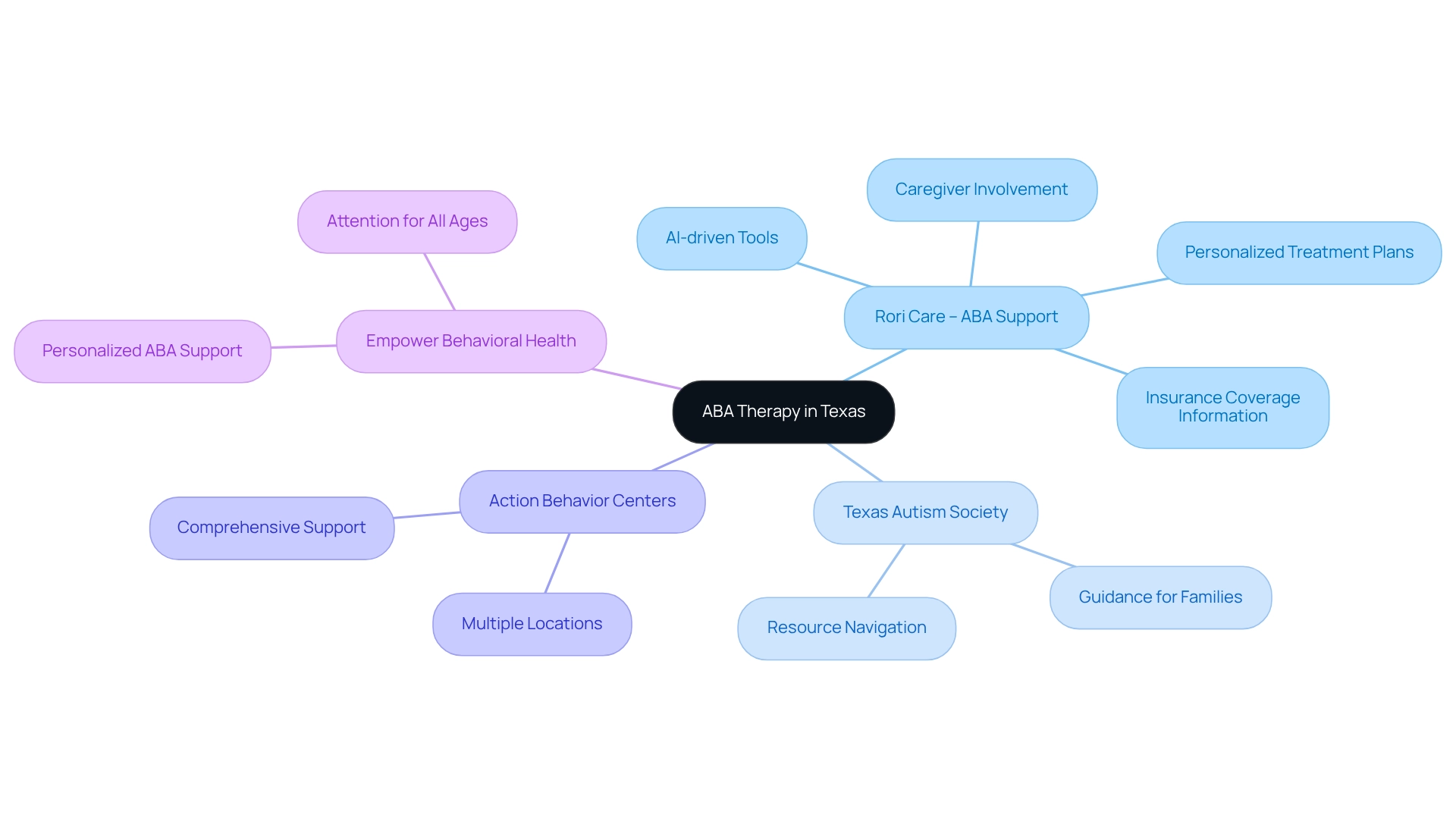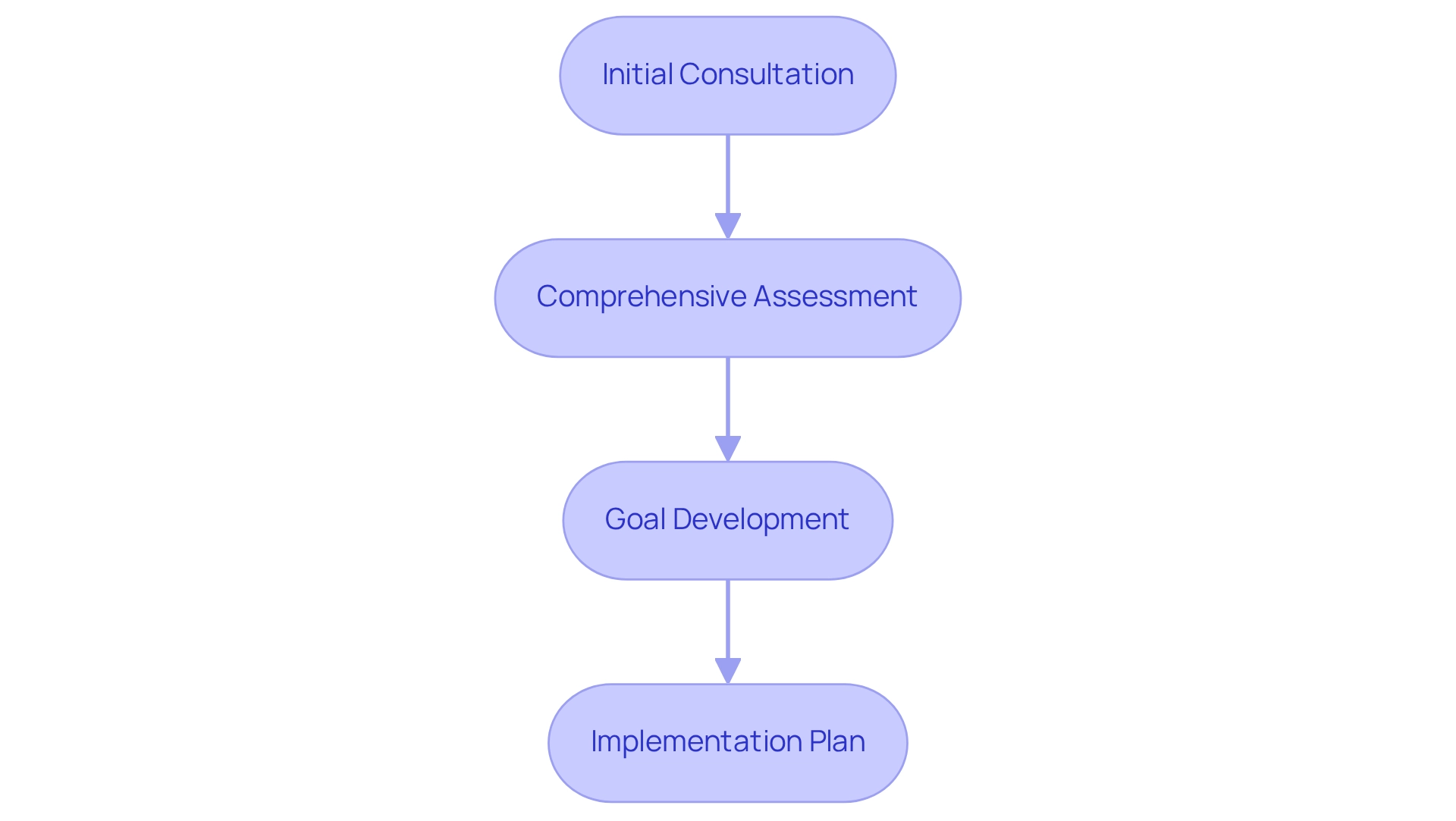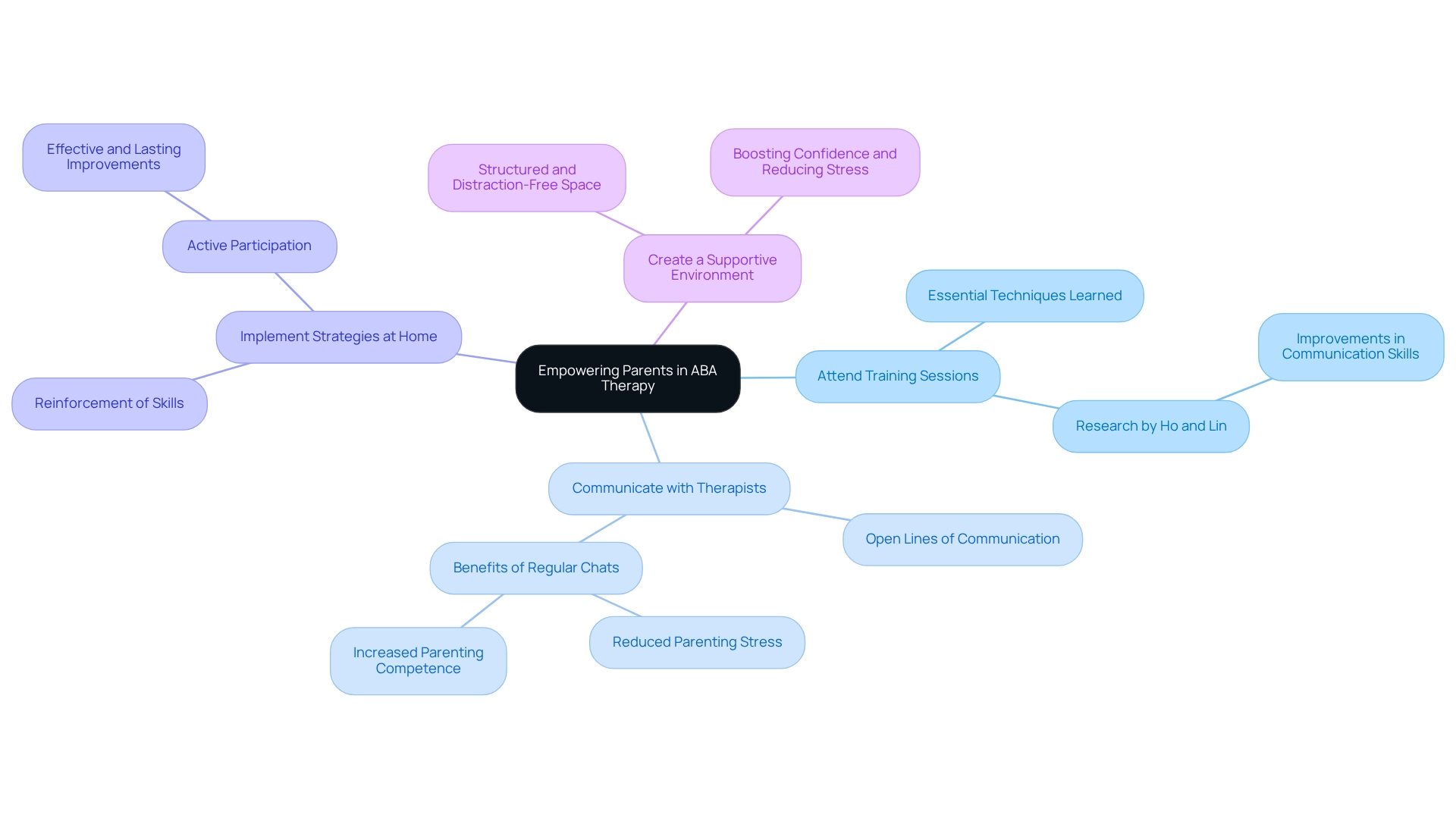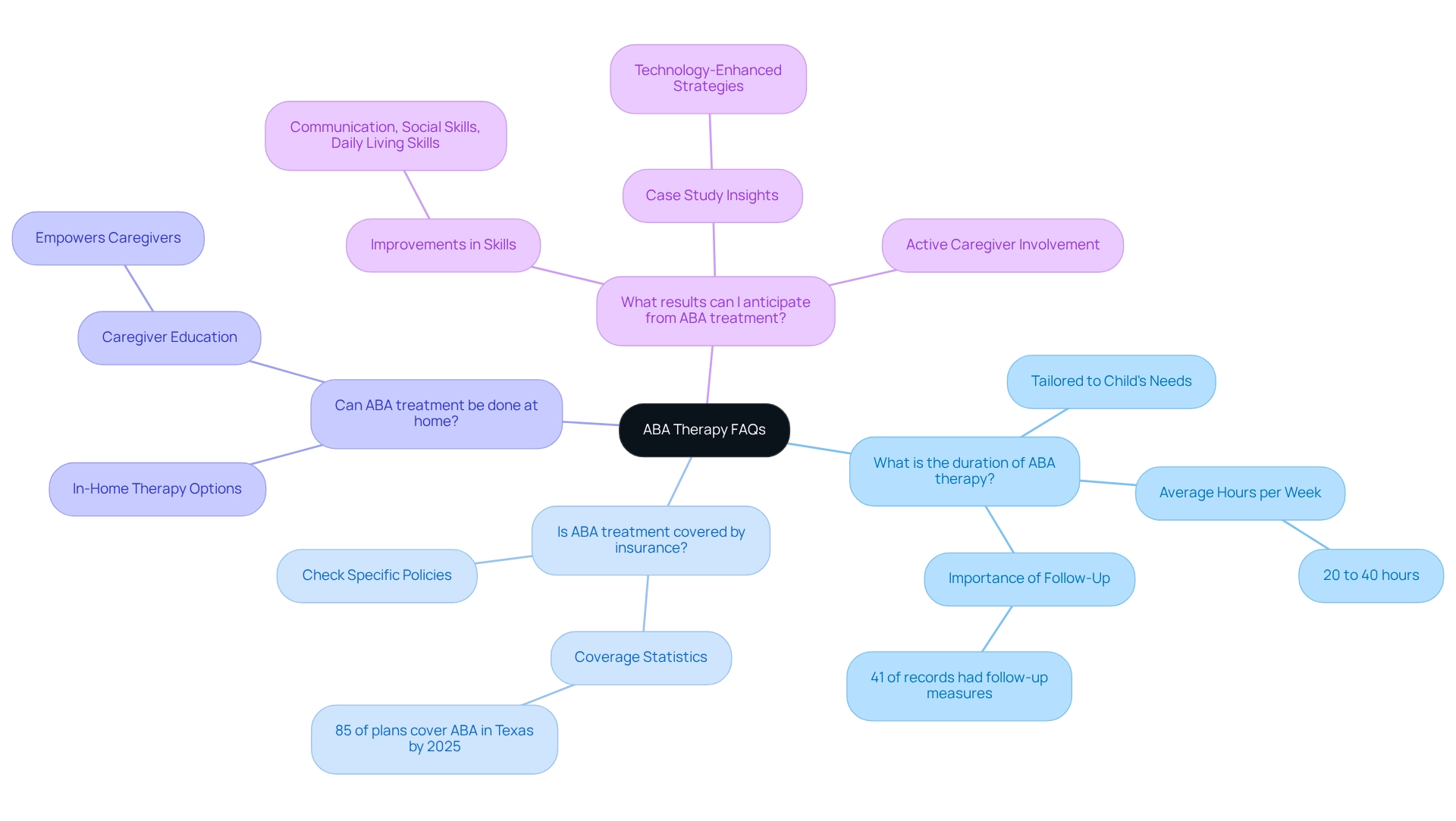Texas ABA therapy is a scientifically validated approach designed to enhance behaviors in children with autism through tailored interventions and reinforcement strategies. This therapy starts with a thorough assessment and involves setting meaningful goals, along with continuous data collection to track progress. It's all about involving parents every step of the way!
What’s really great is that ABA therapy can adapt to various settings, maximizing those positive outcomes for your child. Imagine being able to see your child thrive, whether at home, school, or in the community! Let’s explore this together and discover how we can support your journey toward effective interventions. We’re here to help you every step of the way!
In the world of autism support, Applied Behavior Analysis (ABA) therapy shines as a beacon of hope for many families. This scientifically validated approach not only seeks to enhance specific behaviors in children with autism but also tailors itself to their unique needs, creating a nurturing learning environment. As ABA therapy evolves, exciting advancements in technology and caregiver involvement are changing how services are provided and experienced.
From personalized treatment plans to innovative data collection methods, the journey of ABA therapy is all about progress and empowerment. It paves the way for children to thrive in their everyday lives. As families navigate this complex landscape, understanding the ins and outs of ABA therapy is crucial for unlocking its full potential. Let’s explore this together and see how it can make a difference!
The Texas ABA intervention is a scientifically validated approach designed to enhance specific behaviors in children with autism. It’s based on the idea that behaviors can be learned and modified through reinforcement strategies. Let’s break down the key components of ABA therapy:
At Rori Care – ABA Intervention, we understand that about 50% of the time in ABA sessions often goes to writing reports. To address this, we combine customized treatment with advanced AI technology to monitor and prepare progress reports. This effectively frees up 50% more time for your child's care. Our automatic data collection ensures that our clinical team is always available for your little one without interrupting sessions for data entry.
Rest assured, all data is securely stored, anonymized, and deleted after analysis, prioritizing your privacy and compliance with data protection standards.
Recent statistics show that ABA treatment leads to improved outcomes for children with autism at least 36% of the time across various measures, including cognitive, language, social/communication, and adaptive behavior. This highlights the treatment's effectiveness in addressing a broad range of developmental areas.
Moreover, ABA therapy is adaptable and can be implemented in various settings such as home, school, and clinical environments. This flexibility allows families to weave ABA strategies into their daily routines, maximizing the support available to their kids. Real-world examples demonstrate how ABA interventions can lead to significant improvements in behavior, communication skills, and overall quality of life for individuals with autism.
As research continues, expert opinions consistently affirm the transformative potential of Texas ABA interventions, establishing it as a vital resource for families seeking effective support for their children.
Additionally, equipping caregivers with ABA principles and strategies is crucial for supporting the behavioral goals of children. Educating caregivers not only enhances support but also informs decision-making and improves behavioral outcomes, ultimately empowering them. However, it’s important to note that while ABA methods have shown positive results, there is limited research on the cost-effectiveness of ABA interventions compared to other treatments for ASD.
A recent review highlighted variability in results across different studies, suggesting that further exploration into the cost-effectiveness of ABA-based interventions is necessary, especially regarding their impact on the quality of life for youth and families affected by ASD. As Vivien Symington noted, "the analysis was conceived and designed to extract and code data, providing a clearer understanding of ABA's effectiveness.
In Texas, the ABA support environment is diverse and expanding, with many dedicated providers eager to offer effective, tailored services for youth with autism. Let’s take a closer look at some notable organizations:
By 2025, the number of Texas ABA support providers has seen significant growth, reflecting a wider trend in the increasing demand for autism services. This expansion is crucial, as it provides families with greater access to essential support. Collaboration between ABA providers and schools is also vital, fostering a holistic approach to autism care.
For instance, many ABA providers work hand-in-hand with local schools to implement personalized education plans (IEPs) that integrate therapeutic strategies into the classroom, enhancing the overall development of children.
Rori Care exemplifies the use of technology in ABA support, utilizing AI-driven tools to enhance treatment plans and outcomes. By automating progress report generation through a behavior care engine, Rori Care frees up valuable time for clinicians, allowing them to focus more on direct treatment. This innovative approach tailors the treatment experience for each child while empowering both families and healthcare providers.
Additionally, Rori Care provides information on insurance coverage options, ensuring that families can obtain up to 100% coverage for ABA therapy. By focusing on collaboration and technology, Texas ABA providers are paving the way for a future where every child has the chance to thrive, supported by a network of dedicated professionals and resources. Notably, Molina Healthcare, a FORTUNE 500 organization, underscores the importance of quality healthcare services in this evolving landscape, aligning with the mission to ensure that every individual can flourish and every family has the necessary resources.
Let’s explore this together! We're here to help you every step of the way!

The evaluation process for Texas ABA therapy is such an important step in crafting a personalized treatment plan that truly meets each individual's unique needs. Let's walk through the key stages together:
Active parental involvement is key throughout this process! Your insights are invaluable in shaping an effective treatment plan. Research shows that when Texas ABA recommended hours are fully implemented with active caregiver involvement, 90% of youth make significant progress. This really highlights the importance of regular data collection and ongoing assessment to adapt treatment as needed. Rori Care's behavior care engine even updates behavior intervention and skill acquisition plans after each session based on progress, ensuring that the treatment stays aligned with the child's evolving needs.
Experts agree that customizing treatment plans is essential for success in Texas ABA. As Ralph Moller wisely stated, 'The significance of customization in autism treatment cannot be overstated.' Case studies show that young individuals who receive tailored treatment plans often experience remarkable improvements in behavior and social skills, underscoring the effectiveness of this approach.
Moreover, recent discussions, like the article 'How ABA Therapy Can Help with Community Outings and Public Settings,' showcase the real-world benefits of personalized treatment plans, reinforcing their role in successful community integration. Plus, educating caregivers not only enhances support at home but also complements professional interventions, empowering you to make informed choices that positively impact your child's progress.
Let’s explore this together! We're here to help you every step of the way!

Technology is reshaping Texas ABA practices in exciting ways, making interventions more effective and accessible for families. Let’s take a look at some key innovations that are making a difference:
These technological advancements not only simplify the process but also encourage parents to actively participate in their child’s development. A qualified behavior analyst uses Texas ABA to craft individualized plans that feature measurable goals and evidence-based strategies, all aimed at fostering positive behavior changes and skill acquisition. Continuous evaluation and modification are key to ensuring that the plans remain responsive to each child's needs.
And here’s a little bonus: Rori Care offers a complimentary consultation to explore how these innovative methods can support your child.
Automatic data gathering during clinical sessions ensures secure storage, anonymization, and post-analysis deletion, enhancing the efficiency and effectiveness of treatment. As we move forward into 2025, the impact of technology on ABA practices continues to evolve, with ongoing advancements ensuring that interventions stay innovative and effective.
Let’s explore this journey together! We’re here to help you every step of the way!
Parental involvement is crucial for maximizing the benefits of ABA therapy. Here are some effective ways parents can actively participate in their child's therapeutic journey:
Research shows that parental involvement can lead to significant improvements in a child's communication abilities and overall development. For instance, studies reveal that parents who engage in training programs report enhanced parenting competence and reduced stress levels. By being actively involved, you can significantly enhance your child's learning and development, ensuring they have the tools necessary for success.
However, it's also essential for families and therapists to address any concerns related to potential risks and side effects of ABA treatment, such as increased aggression or burnout, to ensure the safety and effectiveness of the approach. Let’s explore this together!

Here are some frequently asked questions about ABA therapy:
What is the duration of ABA therapy?
The duration of ABA therapy is tailored to each child's unique needs. Generally, young individuals benefit from multiple hours of treatment each week, often lasting for months or even years. Studies show that regular involvement in ABA sessions can lead to significant enhancements in various abilities, with many youngsters participating in sessions for an average of 20 to 40 hours weekly.
Notably, forty-one percent of study records had some follow-up measure, highlighting the importance of ongoing assessment in tracking progress.
Is ABA treatment covered by insurance?
Yes, many insurance plans cover ABA therapy, especially for children diagnosed with autism spectrum disorder (ASD). As of 2025, about 85% of insurance plans provide some type of coverage for Texas ABA services. However, it’s crucial for parents to check the specifics of their coverage with their insurance provider, as policies can vary widely.
Can ABA treatment be done at home?
Absolutely! Many ABA providers offer in-home therapy options, creating a comfortable and familiar environment for your child. This approach not only helps in applying learned skills in real-life situations but also fosters a stronger bond between the therapist and your family.
Caregiver education plays a vital role here, empowering caregivers with ABA principles and strategies. This not only enhances their ability to support their child's development effectively but also helps reduce stress and improve overall family dynamics.
What results can I anticipate from ABA treatment?
While individual outcomes may vary, many studies have shown that children undergoing ABA therapy often experience notable improvements in communication, social skills, and daily living skills. For instance, a case study on technology-enhanced strategies for behavior modification revealed that youngsters receiving tailored ABA interventions displayed improved behavioral outcomes, underscoring the approach's effectiveness. As Granpeesheh et al. noted, "the application of principles of learning and motivation to the solution of problems of social significance" highlights the foundational role of ABA in addressing the needs of youth with autism. Active caregiver involvement and alignment with therapeutic strategies often lead to more effective and lasting behavioral improvements.
These responses aim to equip parents with the knowledge they need to address their concerns and expectations regarding ABA therapy, ensuring they feel empowered in their child's therapeutic journey. Ready to take the first step toward a brighter future for your little one? Let’s explore this together! Sign up for a free consultation with our compassionate team of experts to tailor a development plan that meets your family's needs.

The long-term benefits of ABA therapy are truly remarkable, significantly enhancing a child's quality of life in many ways. Let’s dive into some key advantages!
Now, let’s talk about the essential role of caregivers in enhancing the effectiveness of ABA treatment. By participating in caregiver education programs, they gain a deeper understanding of ABA principles and strategies, which boosts their ability to provide the right support at home. This informed decision-making leads to better behavioral outcomes, as active caregiver involvement aligns with therapeutic strategies, resulting in more effective and lasting changes in behavior.
Additionally, empowered caregivers often experience reduced stress and improved family dynamics, creating a supportive environment for their child's development. Caregiver education programs complement professional interventions, ensuring consistency and reinforcing strategies learned during treatment sessions.
Investing in ABA treatment not only meets immediate developmental needs but also lays the groundwork for lasting success, helping children thrive and reach their full potential. Experts in the field emphasize that starting ABA therapy early, even from the age of 2, can lead to the most impactful outcomes. This makes it a vital step for families looking to enhance their child's future. At Rori Care – ABA Therapy, we’re dedicated to ensuring every child has the chance to flourish, providing families with the necessary tools to support their child's growth. Let’s explore this journey together!
The journey of ABA therapy is one filled with hope and transformative potential for children with autism and their families. This scientifically validated approach focuses on enhancing specific behaviors through tailored treatment plans, comprehensive assessments, and active caregiver involvement. With innovative technology, like AI-powered data collection and telehealth services, ABA therapy is becoming more accessible and efficient. This means therapists can spend more time interacting directly with children, which is so important!
In Texas, the diverse landscape of ABA therapy providers, including organizations like Rori Care, highlights the growing availability of resources dedicated to supporting children with autism. By collaborating with families and schools, these providers ensure that therapeutic strategies are consistently implemented in various settings, promoting holistic development. The emphasis on personalized treatment plans, informed by ongoing assessments and caregiver education, underscores how crucial a collaborative approach is for achieving meaningful progress.
Ultimately, the long-term benefits of ABA therapy go beyond immediate behavioral improvements. Enhanced communication, social skills, and independence empower children to thrive in their daily lives. As families navigate the complexities of autism support, understanding the principles of ABA therapy and the role of technology can truly unlock its full potential. By investing in this transformative journey, families are taking vital steps toward a brighter future for their children, equipping them with the tools to succeed and flourish. Let’s explore this together! We’re here to help you every step of the way!
What is the Texas ABA intervention?
The Texas ABA intervention is a scientifically validated approach designed to enhance specific behaviors in children with autism, based on the idea that behaviors can be learned and modified through reinforcement strategies.
What are the key components of ABA therapy?
The key components of ABA therapy include Assessment (evaluating the child's current skills and behaviors), Goal Setting (creating measurable and achievable goals), Intervention (implementing strategies to reinforce positive behaviors), and Data Collection (monitoring progress to evaluate effectiveness).
How does Rori Care utilize technology in ABA therapy?
Rori Care combines personalized ABA assistance with advanced AI technology to automate data collection and progress report generation, effectively freeing up 50% more time for direct treatment and care.
What are the statistics regarding the effectiveness of ABA treatment for children with autism?
Recent statistics indicate that ABA treatment leads to improved outcomes for children with autism at least 36% of the time across various measures, including cognitive, language, social/communication, and adaptive behavior.
In what settings can ABA therapy be implemented?
ABA therapy is adaptable and can be implemented in various settings such as home, school, and clinical environments, allowing families to integrate ABA strategies into their daily routines.
Why is caregiver involvement important in ABA therapy?
Caregiver involvement is crucial as it enhances support for children’s behavioral goals, informs decision-making, and improves behavioral outcomes, ultimately empowering caregivers.
What organizations provide ABA support in Texas?
Notable organizations providing ABA support in Texas include Rori Care – ABA Support, Texas Autism Society, Action Behavior Centers, and Empower Behavioral Health.
How does Rori Care support families regarding insurance for ABA therapy?
Rori Care provides information on insurance coverage options, ensuring that families can obtain up to 100% coverage for ABA therapy.
What is the significance of collaboration between ABA providers and schools?
Collaboration between ABA providers and schools is vital as it fosters a holistic approach to autism care, enhancing the overall development of children through personalized education plans (IEPs) that integrate therapeutic strategies into the classroom.
What does the future look like for ABA support providers in Texas?
By 2025, the number of Texas ABA support providers is expected to grow significantly, reflecting the increasing demand for autism services and providing families with greater access to essential support.